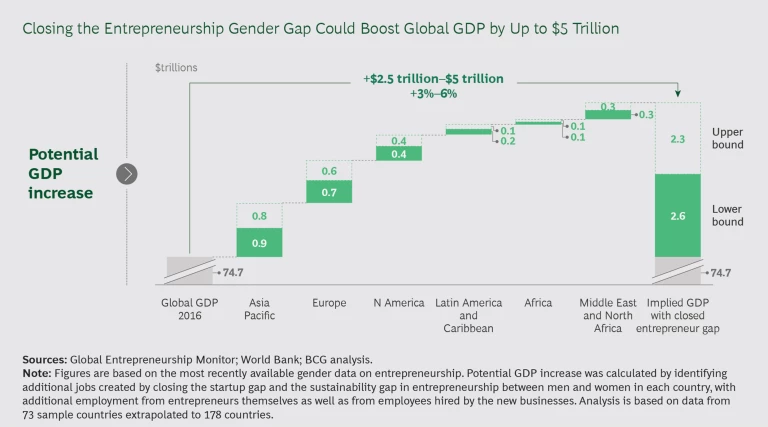What if we were to tell you that there is a sure-fire way to add $5 trillion to the global economy—that companies around the globe are underutilizing a vast opportunity?
Such a catalyst does exist today: women entrepreneurs.
New analysis by Boston Consulting Group (BCG) shows that if women and men participated equally as entrepreneurs, global GDP could rise by approximately 3% to 6%, boosting the global economy by $2.5 trillion to $5 trillion. (See the exhibit.) However, unleashing the power of women entrepreneurs will require action from a range of groups, including venture capitalists, nonprofit organizations, and corporations. These efforts must address a critical and at times overlooked issue: the lack of networks that effectively support and mentor women entrepreneurs.
The Gender Gap in Entrepreneurship
To understand better the entrepreneurial gender gap—and how much progress is being made toward closing it—BCG analyzed female entrepreneurship data from the Global Entrepreneurship Monitor (GEM), regionally and country by country. This analysis yielded the following findings:
- Across all regions, the percentage of working-age men who start a new business exceeds the corresponding percentage of working-age women by roughly 4 to 6 percentage points.
- Four countries—Vietnam, Mexico, Indonesia, and the Philippines—have managed to buck the global norm; more women than men launched startups in these countries in 2016.
- In 50% of the 100 countries studied, the gender gap in startup activity is narrowing, with the biggest gains occurring in Turkey, South Korea, and Slovakia.
- In 40% of countries, however—most notably in Switzerland, Uruguay, and South Africa—the gender gap is widening.
Although the gender gap in startup activity is fairly consistent across most countries, the gap in long-term business success varies more widely. In the Middle East and North Africa, for example, women's businesses are about half as likely as men’s to remain in operation 3.5 years after creation, while in Latin America, women's businesses lag in that sustainability measure by 11 percentage points. In all regions except North America, women-led companies have lower sustainability levels than companies led by men.
Women@BCG Podcast
Women@BCG Podcast
Listen as Cherie Blair, Founder of the Cherie Blair Foundation for Women, and Shalini Unnikrishnan, BCG Managing Director and Partner discuss the key levers to closing the gender gap. Learn more about the Foundation’s 100,000 Women campaign here.
The Power of Networks
What can countries do to help women-led businesses survive and thrive?
Unequal access to financial support plays a significant role in the gender gap, particularly for women starting new enterprises. According to a BCG analysis of 2018 data from MassChallenge, a US-based global network of accelerators, investments in companies founded or cofounded by women averaged $935,000, which is less than half the average of $2.1 million invested in companies founded by men entrepreneurs. This disparity exists despite the fact that startups founded and cofounded by women actually performed better over time, generating 10% higher cumulative revenue over a five-year period: $730,000 for women compared with $662,000 for men.
Access to startup capital is not the only problem, of course. Women entrepreneurs also need to overcome the sustainability deficit and a growth deficit (the greater tendency of woman-led companies to stagnate over time).
Our research shows that while there are many reasons for these deficits—including differences in access to human capital, social capital, and ongoing financial resources—a key factor is women’s relatively limited access to robust support networks. In low- and middle-income countries, for example, greater availability and use of entrepreneurial networks are linked to smaller gender gaps in business sustainability. Peer-to-peer networks encourage women to set higher aspirations for their businesses, plan for growth, and embrace innovation.
In Nigeria, the Cherie Blair Foundation for Women, with support from the ExxonMobil Foundation, piloted the Road to Women’s Business Growth, a collaborative venture that helped women business owners boost their business knowledge and gain access to financial institutions and new markets. An independent evaluation of this program found that some of its greatest benefits came from the peer-to-peer and professional networks that it facilitated. As one woman put it, "If you’re facing any challenges or you need some contacts, you just say it and your sisters come to your help. We call ourselves sisterpreneurs." The women’s financial performance also improved, with median profits increasing by 31%.
In our experience, the best networks are built on the principles of intent, inclusion, and interaction:
- Intent. Start by defining the network’s purpose. Networks should be much more than a glorified Rolodex. What can women gain by joining the network? Will they get access to human and financial capital, as well as social capital? How can the network help women achieve tangible business goals?
- Inclusion. Next, choose participants carefully. The best networks have a highly dedicated founder, an active membership and a diverse membership base, including a mix of new entrepreneurs and more established business owners, ideally with varied cultural backgrounds.
- Interaction. Finally, structure the network to facilitate both formal and informal interactions. Formal training has its place; but informal, peer-to-peer interactions are crucial to building trust and ensuring that the network stays relevant over time. Online platforms can be critical to success in this area.
It is no exaggeration to say that women’s entrepreneurship has the power to change the world—and the benefits go far beyond boosting global GDP. Closing the gender gap in entrepreneurship and fueling the growth of women-owned enterprises will unleash new ideas, services, and products into our markets. And ultimately, those forces may redefine the future.







